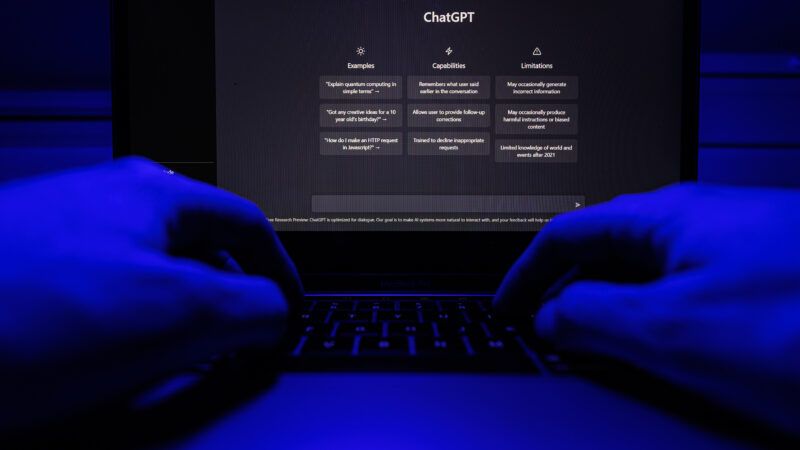ChatGPT Isn't Coming for Your Job (Yet)
Content-generating A.I. will probably enhance human labor rather than make it obsolete.

When ChatGPT was introduced to the general public at the end of last year, many people began to fear that artificial intelligence (A.I.) might soon make their job obsolete.
Of course, horse-and-buggy-makers are gone, and farming requires something like one-hundredth of the labor input it used to. That's a good thing: Professions have gone extinct for centuries. New jobs emerge in the wake of old ones. A reshuffled labor market requires workers to gain different skills, while companies focus on solving different problems. That can be tough if you're in your mid-50s and on the receiving end of that technological shift, but it's not a catastrophic obstacle for economies at large.
Up until now, machines had been unable to venture into the creative domains long deemed human: the realms of emotion, compassion, creativity, and personality. There are few bestselling novels written by a computer, A.I.-powered inspirational speakers, or robots providing psychological help to clients in need. Some people now fear that A.I. will learn even these soft skills.
Economist Nouriel Roubini devotes a chapter in MegaThreats: Ten Dangerous Trends That Imperil Our Future, and How To Survive Them to A.I. He lists example after example of robots inching closer to overtaking humans at our own game. "What happens," he asks, "when that technology is actually intelligent? … No matter what work you do, artificial intelligence might eventually do it better." Surely a robot can't connect with an opera audience, or mimic writing that creates that magic bond between author and reader.
With this in mind, I looked at two programs in my own fields of writing and translation: OpenAI's ChatGPT, the text-generative A.I. that made such a social media splash in the last two months, and DeepL, developed by a German startup that just raised money at a $1 billion valuation. Both indicate that there's something to this latest bout of technological scare, but that mass employment among knowledge workers is still a ways off.
The service Grammarly already helps with language flows. Most word processors have built-in spell check. Even though keeping track of commas and hyphens should be easy, it usually isn't. Writing new content is even more of a stretch.
All over social media, I found examples of ChatGPT-generated output that looked humanish. That is, if you count the stumbling and robotic prose you might get from a 12-year-old or a bored college student fulfilling their essay's word requirement via endless rephrasing. Most ChatGPT writing I've seen is dull, shallow, and soulless—none of the characteristics that make good writing come alive.
Roubini thinks mass unemployment due to A.I. is inevitable in the coming years. What the best A.I. writing generators put out is indeed indistinguishable from bad human writing. Bad writers, cheating students, lazy professors, and journalists echoing press releases have clearly met their match. But the more human, creative, authentic storytelling that is the center of all meaningful writing has not.
For translation services, progress has been much more impressive. Between some language pairs, Google Translate has already gone from being a complete joke to being quite usable—even for technical texts, like legal documents, which were previously Linguee's forte. DeepL noticeably improves on Google Translate's output and was "originally trained on a database of over a billion translations and queries, plus a method of double-checking translations by searching for similar snippets on the web," according to its developer.
When I sparingly used DeepL for a recent translation project, it performed miles better than other software. It translated blocks of text much faster than a human ever could but its accuracy, vocabulary, and understanding of context was still subpar, rapidly deteriorating with a sentence's complexity. For single words or phrases, established two-language dictionaries often produced more exact translations. DeepL is an impressive feat of translation progress, of course, but still in need of human supervision.
While pessimists like Roubini frequently express fears that this new technology will take away jobs from white-collar workers, content-generating A.I. will probably enhance human labor rather than make it obsolete. Robert Wright and Aleksandra Przegalinska conclude that "Humans will use AI as yet another tool, much like they have used Acheulean hand axes and satellite-controlled tractors to do more work in less time or with less energy"—just like so many other technologies have done before it.


Show Comments (60)